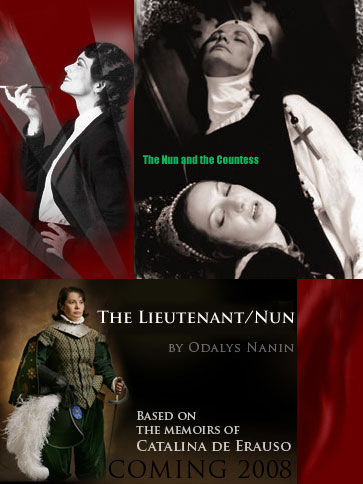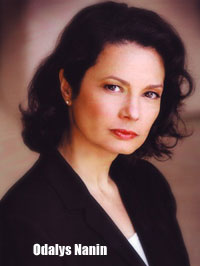Odalys Nanin of MACHA Theatre Company – Building Social, Cultural, and Artistic Bridges
 Odalys Nanin is the founder and producing artistic director of MACHA Theatre and Films. She has appeared in soap operas, series, T.V. commercials, and at least 30 theatre productions in New York and Los Angeles. Nanin has a stellar reputation for writing, directing, and producing theatre in Los Angeles. She has also received three Drama-Logue Theatre Awards for direction, performance, and production of Vargas Llosa’s “La Chunga.” “Skin of Honey” is the fifth play she has written, and she produced it in 2007. Her other plays are “Love-Struck” (1997), “Garbo’s Cuban Lover” (2001), “The Nun and the Countess” (2003), and “Beyond Love” (2005).
Odalys Nanin is the founder and producing artistic director of MACHA Theatre and Films. She has appeared in soap operas, series, T.V. commercials, and at least 30 theatre productions in New York and Los Angeles. Nanin has a stellar reputation for writing, directing, and producing theatre in Los Angeles. She has also received three Drama-Logue Theatre Awards for direction, performance, and production of Vargas Llosa’s “La Chunga.” “Skin of Honey” is the fifth play she has written, and she produced it in 2007. Her other plays are “Love-Struck” (1997), “Garbo’s Cuban Lover” (2001), “The Nun and the Countess” (2003), and “Beyond Love” (2005).
Tell me about MACHA Theatre Company and how you acquired it.
MACHA Theatre is a landmark which used to be a dealership for Mercedes Benz. It was renovated for theater, and for 32-35 years Shakespeare plays were produced there. Inside the theatre is a mini version of the Globe Playhouse in London. The owner recently passed away, and destiny called me somehow. I had just done a play here two years ago that had been very successful. And twenty years ago I did a play for the owner. I played Jessica in The Merchant of Venice. I [discovered] that he [the owner] had passed away, and it was up for rent, and I went for it.
You are also an actress?
Yes, I’m a writer; I direct, produce, and I perform. [Last] September we did “Skin of Honey”. I did my first political play. [It was] a love story set in 1961 [about] two lovers torn apart during the invasion in Cuba. This was my sixth play. I wrote it and co-directed it with Alejandra Flores . I love to write Romantic comedies, but that was the first time that I tackled a [political issue]. I threw the love story in it.
I created a gallery wall, a screening room called Garbo’s Screening room for anyone who wants to come in and do a documentary or a short.
Do you rent the theatre outside of your own productions?
When I am not producing my plays, I rent it to other productions coming in. I pick all the work. I want it to be very good and cutting edge and have a message.
How long do the plays run?
A play runs 6-8 weeks, Thursdays through Sundays.
So you’ve written six plays?
I wrote six plays. They will be produced by Bi-lingual Press in Arizona next year as a textbook. I have been producing theatre since 1992. I did a few plays in North Hollywood, including “Garbo’s Cuban Lover,” which also won an award, and it was rated as one of the best 10 plays by the Advocate Magazine. I eventually adapted it to the screen. Eventually it will become a movie.
What goes into producing a play?
First you have to have an idea. I have to be driven by that idea. It comes to me and I can’t stop thinking about it, so I have to write about it. It usually takes me about two weeks to a month to write about it. Then, you do a stage reading of it, rewrite and set it for production for the following year, cast it, and rehearse it.
As a producer are you required to know everybody’s job, too?
Yes, I have to know about the lights and sound, and I create and pick the songs that go into the play. I cast the play…about sixty percent of it is casting it correctly. What’s interesting about the plays is I started “Skin of Honey in 1996”. Last year we were talking about teenagers and Cuba, and I remembered the scene I had written in 1991. The play almost tells you when it should be written. So never throw out anything that you write.
Do you feel that having been an actress has also helped you as a producer?
Oh, absolutely! The reason I became a writer/director/producer is because I was an actress. You know as an actress you go out on auditions and sometimes you audition for parts that you’re not very attracted to. It got to a point that I really wanted to implement my talent into the right roles…and so by writing them, you actually create the roles you want to play. And that’s what I did. You have to put your craft into something that you really love.
Highest High
I have to mention that I also do short films. My first one was based on a story that my father told me a long time ago. He made me a promise before coming out to the United States. He said that I was going to have my own little car to drive on the streets. I had forgotten about that. Twenty years go by, and I write a short film about it. It’s my first short film. I had no budget, but I got 25 people to volunteer for a three-day shoot: Friday, Saturday, and Sunday. The first shoot was at a park, and we had to be there at 7:30 in the morning…and I was driving up the road hoping they were there. They were all there–just volunteers who were there because they liked the story. The day I finished the story, it was in the can. I had those reels…and I was driving in my car…and all of a sudden I started to hysterically cry and hysterically laugh. It was the highest height that I could’ve reached–that I had accomplished that.
Sunday. The first shoot was at a park, and we had to be there at 7:30 in the morning…and I was driving up the road hoping they were there. They were all there–just volunteers who were there because they liked the story. The day I finished the story, it was in the can. I had those reels…and I was driving in my car…and all of a sudden I started to hysterically cry and hysterically laugh. It was the highest height that I could’ve reached–that I had accomplished that.
What was the film called?
It was called “Only One Suitcase”. Just the thrill of these people showing up and working really hard to make it all happen was great.
Lowest Low
Not having enough money is a low. I like my productions to have high production qualities. With the play “Beyond Love”, I didn’t have enough money for the set. It was bare bones. It looked fine, but I knew I wasn’t doing it the way that I wanted. I know it’s not a big deal for people coming to the theater, but when you put so much into it and you know it could be better, but you don’t have the means…that’s a real low.
Is there anything you’d like to add to create more theatre patrons?
Create more women writers. I am trying to put together a workshop for teenagers that can not only write as an ensemble, but perform the piece and showcase it, exposing the young up-and-coming actresses to the theater. I think exposing as many youngsters to this world would make a big difference in their grown-up years.
What does MACHA stand for?
MACHA means moheres (women) advancing culture, history, and art. We were formed in 2000 because we did not have a place or a way to express ourselves and have a voice. It is a group of women who are committed to bringing about plays about women that people don’t really know about.
To learn more about MACHA Theatre Company, visit the website atwww.machatheatre.org.
Interviewed by Kaylene Peoples